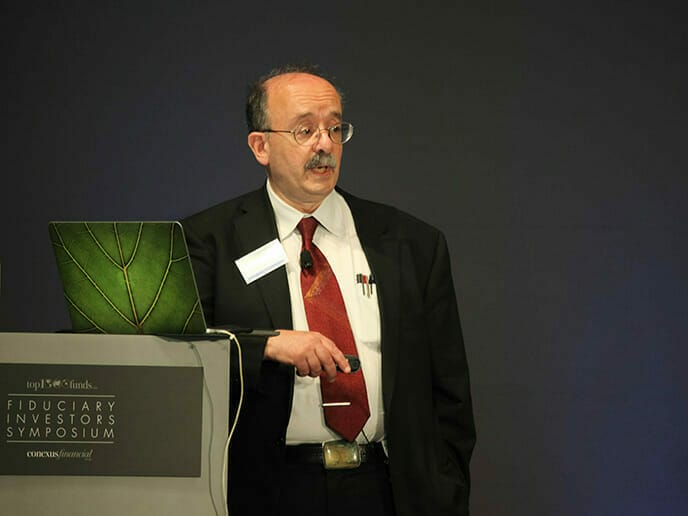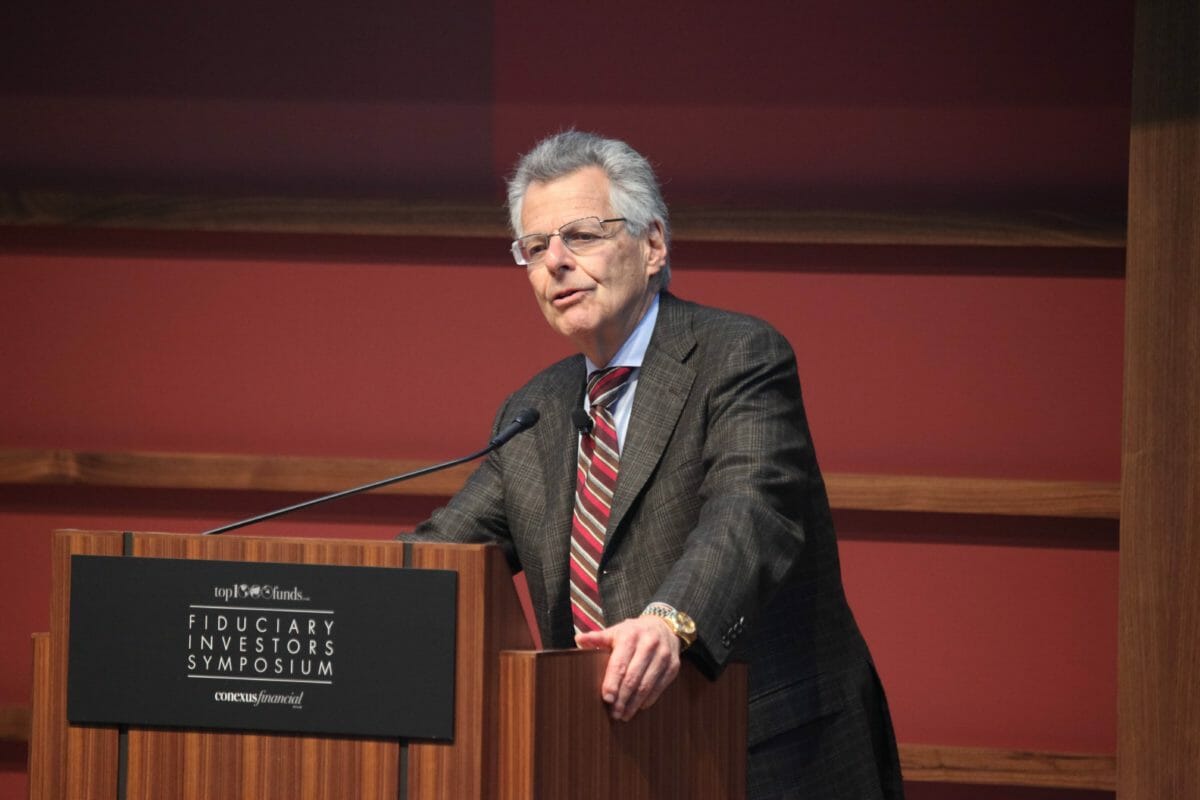At the 2018 Fiduciary Investors Symposium Amory Lovins, co-founder and chief scientist at Rocky Mountain Institute delivered a speech on Disruptive Energy Futures: Risks And Opportunities. You can listen to his talk in full below or download his presentation and notes here.

Investors need to prepare for unprecedented change in the oil, auto and electricity industries, said Amory Lovins, co-founder and chief scientist at the Rocky Mountain Institute, in the opening speech to the Fiduciary Investors Symposium at Stanford University on Sunday. Speaking to delegates who represented 87 asset owners from 14 countries, accounting for a combined $8 trillion in assets under management, Lovins talked of unprecedented opportunity and hope in the coming years.
The electricity industry is undergoing its biggest transformation in centuries as supply shifts to modern renewables. Renewable energy production hit 1 trillion watts of capacity three years ago, the next trillion watts will be added in just four years, pushing fossil fuels out of the market, Lovins said. He added that fossil fuels were more at risk from competition than regulation.
“In the next 4-5 years, cheaper renewables will offset growth in all fossil fuels, tipping them into decline,” he warned.
Last year, modern renewables accounted for 64 per cent of the world’s net additional generating capacity. By 2020, renewables will beat fossil fuels in every major region on earth.
He spoke of an “end game” that would put $25 trillion of energy infrastructure at risk and threaten not only national economies that depended on oil and gas revenues but also the energy firms that dominate equity and debt capital markets. It would also affect non-energy sectors such as the auto and steel industries, leading to price declines, stranded assets and massive restructuring, he said.
Lovins also warned gas was no safe haven among fossil fuels; all of them, including gas, are in “deep trouble” against unsubsidised renewables, he said, as he warned there would be stranded assets from planned gas power plants in the US.
“I hope these won’t be your dollars,” he told the conference. “Global gas demand will dwindle in step with oil.”
Two-fifths of India’s coal plants are already stranded assets and those not yet built are pre-stranded assets, he said. China has cancelled many of its coal developments and is cutting capacity at its existing plants by 2.5 per cent each year. Disruptors are also entering the utility industry, “gobbling” revenues before firms can adapt. For example, customers are discovering how to use less electricity, make their own, and even trade it. Dutch consumers can now buy renewable electricity directly from one another.
Solar wins
Solar output worldwide “is scaling faster than cell phones”, Lovins said. In 2013, China added more photovoltaic (PV) capacity than the US added cumulatively in the previous 59 years; last year, china added more PV in the month of June than the US added in the whole year. And the cheaper solar becomes, the more people buy it.
Lovins also answered critics who argued that fossil fuels were a better energy source because renewables were variable.
“Variable doesn’t mean unpredictable,” he said, adding that operators run grids like a conductor – no instrument plays all the time but the ensemble always makes lovely music. Indeed, Lovins pondered whether the grid itself would become a stranded asset, just as copper wire was bypassed by wireless phones.
Cars: PIGS give way to SEALS
There are now an estimated 4 million electric vehicles on the road, with a forecast for a million more every six months. The price of these cars is forecast to reach parity with petrol vehicles by the early 2020s. “Scornful” and “underperforming” automakers will scramble for catch up.
Lovins said the auto and electricity industries were coming together to “eat” the oil industry and would put it out of business as the world switched to renewables and electric cars. China sold more electric vehicles last year than the whole world sold the previous year. India and Germany were targeting 100 per cent electric vehicles by 2030 in growth that would be fanned by falling battery costs and batteries that didn’t use lithium or cobalt or anything “scarce or flammable or toxic” but had a comparable or better performance than traditional batteries, he said.
Modern design is also feeding electric vehicle growth, with new, lighter hybrid models emerging. Lovins said PIGS (personal internal-combustion gasoline steel cars) were giving way to SEALs (sharable electric autonomous lightweight cars.)
‘Dollars on the table’
In the absence of policy leadership, smart cities and state policies were leading the way, together with business, Lovins said.
“The private sector smells dollars on the table,” he said, noting that the world is moving towards the Paris Agreement’s 2-degree goal and adding that there is no need for despair but nor should the world be complacent. We must “double down” on what makes sense – and steer money and capital in that direction, he said.
Lovins predicted that higher oil prices would help drive change at such a great pace that it would be a formidable challenge.
“When value propositions change, markets flip with breathtaking pace,” he said, pointing to the switch from horses to cars in the 1900s, which took just 13 years.
“The horse-and-buggy industry thought they had years to adapt,” he said, adding that the change was fanned by financial innovations such as car loans.
“Firms hampered by old thinking won’t be around,” Lovins said, because the pace of transformation is set by insurgents not incumbents. He said investors “flee” before customers, because capital markets sniff out disruption. When an industry is headed for the “toaster”, investors don’t wait for the toast, they invest in successors.
Lovins said that prudent and active investors find themselves at a unique tipping point and have important roles to play in stalling the risk of stranded assets and systemic risk to the financial system. He urged investors to encourage those firms they own to change because they would earn higher returns and help “crank down” the global thermostat.
Companies that changed would be heroes to their shareholders, he said, and the world.
“It is your fiduciary responsibility to enable a new energy system and not protect the old,” Lovins said.



